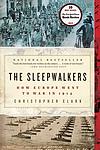The Greatest British "Fiction, History" Books Since 2010
Click to learn how this list is calculated.
This list represents a comprehensive and trusted collection of the greatest books. Developed through a specialized algorithm, it brings together 286 'best of' book lists to form a definitive guide to the world's most acclaimed books. For those interested in how these books are chosen, additional details can be found on the rankings page.
Genres
The category of "History" in books refers to the study and interpretation of past events, societies, and cultures. It encompasses a wide range of topics, including political, social, economic, and cultural developments, as well as the lives of individuals and groups who have shaped the course of history. History books can be written from various perspectives and may focus on specific time periods, regions, or themes. They aim to provide readers with a deeper understanding of the past and its impact on the present.
Countries
Date Range
Reading Statistics
Click the button below to see how many of these books you've read!
Download
If you're interested in downloading this list as a CSV file for use in a spreadsheet application, you can easily do so by clicking the button below. Please note that to ensure a manageable file size and faster download, the CSV will include details for only the first 500 books.
Download-
1. Through the Language Glass: Why the World Looks Different in Other Languages by Guy Deutscher
This book explores the link between language and perception, challenging the conventional belief that languages are only tools for describing reality and do not influence the way we perceive the world. The author delves into how different languages can shape the way their speakers understand and interact with their surroundings, arguing that linguistic differences can significantly impact cognition and perception. The book combines linguistic analysis, cultural history, and cognitive science to provide a fascinating examination of how our mother tongue can affect our cognitive processes, including color perception and spatial orientation.
-
2. Midnight In Chernobyl by Adam Higginbotham
"Midnight In Chernobyl" is a non-fiction book that tells the story of the 1986 Chernobyl nuclear disaster. The book provides a detailed account of the events leading up to the explosion, the immediate aftermath, and the long-term effects of the disaster. It also explores the political and social context of Soviet Ukraine at the time, and the impact that the disaster had on the country and the world. The book draws on interviews with survivors, officials, and experts, as well as archival documents and scientific research, to provide a comprehensive and compelling narrative of one of the worst nuclear accidents in history.
-
3. The Sleepwalkers: How Europe Went To War In 1914 by Christopher Clark
"The Sleepwalkers" by Christopher Clark is a comprehensive account of the events leading up to World War I. The book argues that the war was not caused by any one nation or individual, but rather a combination of factors including nationalism, alliances, and miscommunication. Clark explores the complex political landscape of Europe in the early 20th century and the actions of key players such as Kaiser Wilhelm II and Archduke Franz Ferdinand. The book provides a detailed analysis of the events leading up to the war and challenges traditional narratives of blame and responsibility.
Reading Statistics
Click the button below to see how many of these books you've read!
Download
If you're interested in downloading this list as a CSV file for use in a spreadsheet application, you can easily do so by clicking the button below. Please note that to ensure a manageable file size and faster download, the CSV will include details for only the first 500 books.
Download

